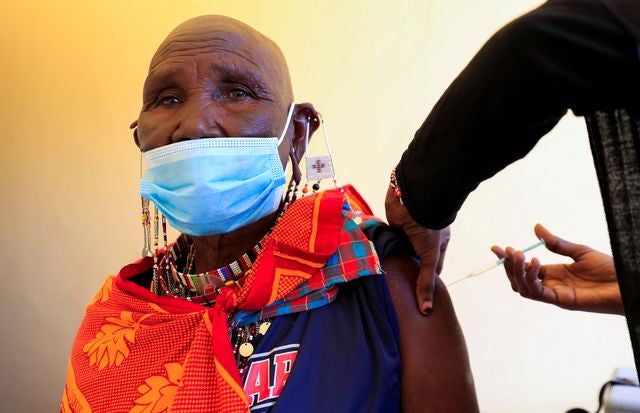Africa's vaccination lessons
Health leaders from the continent shared their research and experiences on vaccine hesitancy and other issues during an event hosted by the UK’s Health Rapid Support Team to discuss COVID-19 vaccination efforts in low- and middle-income countries

Having all the vaccines in the world is not enough if your community isn't ready to accept them.
That was one of the main takeaways from African health leaders who participated in the COVID-19 Vaccination in Low- & Middle-Income Countries: Lessons from Past & Current Campaigns webinar, hosted by the UK’s Health Rapid Support Team (UK-PHRST) on September 22. The event was an opportunity to share experiences and learnings from carrying out vaccinations during epidemics, as well as early lessons from the COVID-19 roll-out in low and middle-income countries.
A lack of security and misinformation and rumors were among the vaccination barriers discussed by the panelists, which included Dr. Mohammed Abdulaziz and Dr. Abubakar Ahmed Tijani of the Africa Centres for Disease Control and Prevention, and Julie Collins, Research Fellow in Public Health at the UK-PHRST and the London School of Hygiene & Tropical Medicine and Public Health England.
Adult populations require more engagement and discussion to be convinced of the benefits of vaccination, said Collins, who is also an Exemplars in Global Health research partner. Adults “don’t think there’s anything wrong with them. They even feel themselves that it’s a waste of time vaccinating them, so you have to define the disease more vigorously than you do for children,” she said, paraphrasing a national health agency representative from East Africa, who was a key participant in her research.
Community engagement and social mobilization, Collins added, must take place in at least one month before the start of vaccination campaigns, and local health workers – ideally known members of the community – must be well-equipped to foster trust and explain the importance of being vaccinated. Collins said her team’s research on Meningitis A, Yellow Fever, and Ebola vaccine roll-outs showed there were similar challenges to the rollout of the COVID-19 vaccine.
Understanding the drivers and scale of vaccine hesitancy – and developing a strategy to combat it – is just one of the ways the Africa CDC is supporting the African Union, Dr. Abdulaziz told the event. He added that his organization is committed to supporting member states in several ways, including helping them implement systems and tools for ensuring effective communication during the pandemic; assisting with procurement and logistics; setting up vaccination centers; providing pharmacovigilance; strengthening genomic sequencing; providing technical assistance; and ensuring data and information systems are aggregated and interoperable.
Dr. Tijani added that if 1.3 billion people are to be vaccinated against COVID in Africa – whose countries have very different needs, working styles and cultures, as well as human resources for health capacity – both stakeholder collaboration and human resources will be key. Flexibility and adaptation will also be essential, he added.
He cited Nigeria's TEACH strategy as an example of one that was already paying dividends. TEACH is an acronym for a five-part strategy that includes traditional microplanning – or conducting a comprehensive desk review microplan to identify resources needed to vaccinate populations; electronic self-registration, which deploys website addresses to capture health care worker and general population data within specified periods, and uses it for organized scheduling; assisted electronic registration, which allows local health facilities to support mass registration; concomitant house-to-house (H2H) eregistration, focusing on areas with low turnout; and finally H2H team deployment to rapidly increase e-registration, as an added push to register eligible beneficiaries.
While acknowledging that adequate vaccine supply is still a challenge in Africa, Dr. Tijani – like Collins and Dr. Abdulaziz – said that vaccine hesitancy needed to be combated by strengthening advocacy, media engagement and community engagement. It’s a lesson he has seen in other pandemics, but he reiterated that, for COVID-19 in particular, nobody wins until everyone wins and no one is safe until everyone is safe.
